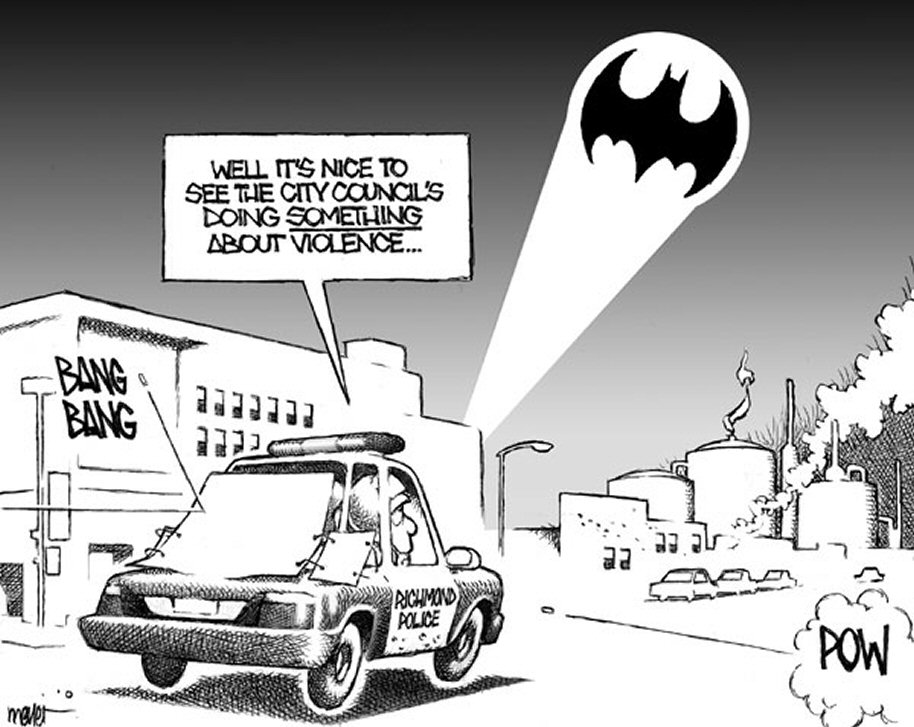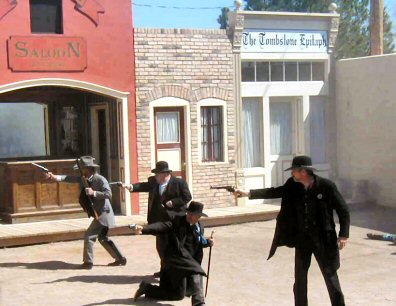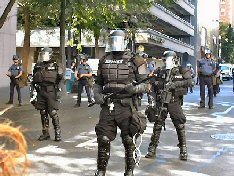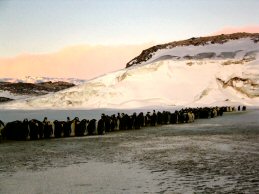June 29, 2005
Batman Ain’t Gonna Cut It
Richmond State of Emergency Is Just A Symptom of An Alienated Society
By Fred H. Arm
On June 23, 2005, the Chronicle published this satirical political cartoon by Tom Meyer about the citizen’s clamoring for the City of Richmond to declare a state of emergency. “Emergency” has been defined as:
a sudden unforeseen crisis (usually involving danger) that requires immediate action; a state in which martial law applies; an unforeseen combination of circumstances or the resulting state that calls for immediate action, an urgent need for assistance or relief.
Is this really an emergency? A crisis? I think not. This sort of lawless activity has been going on for centuries. It’s not until coincidentally there have been a few more such killings placed closely together in time that the population panics and demands that the City and the police protect them.
In the 1800’s, when the gold ran out, miners from the north streamed into the lawless cauldron of Los Angeles. Gangs preyed on stagecoaches and the murder-rate soared. Presaging present times, race relations were awful: white vigilante groups, backed by landowners, preyed on Mexicans and Native Americans, and Mexicans formed gangs to fight back. In 1871, an anti-Chinese riot killed 20.

And so, the same beat goes on, only with different precipitating factors and different players. Richmond is unique in the Bay Area in that it has a large minority population left over from the influx of defense workers during World War II. When the war ended, so did the jobs. The population had to scramble to survive just as it did when the gold rush ended.

Families, as we knew them, disintegrated largely from the lack of a steady breadwinner. Values changed. The entitlement generations were fashioned from the disenfranchised youth evolving out of the “me” generation. The emotional support and guidance now comes from the “gang” way of life rather than the nuclear family. The drug culture also evolved to provide a quick fix both financially and emotionally for the alienated youths and their broken families. The cops, no longer walking their beats, had become the enemy.
Unemployment and broken homes further fueled the alienation such that “gang values” now provide the youth with a powerful set of mores that can instantly gratify the most primitive of impulses. If someone crosses you, insults you, or impinges on your territory, the ensuing retribution is usually death. The killing fields engender very little remorse or empathy. This is their new way of life and they are just not interested in traditional values or mores. How much difference is there between the gunslingers of the old frontier days and the gangs in Richmond?

Clearly, until there is a cultural upheaval of substantial magnitude, the killings will go on and on. No matter how many millions are spent on police, it will not stem the tide of needless bloodletting. No doubt increased police activity may increase the number of police officers killed and further solidify the isolation and division in our society. The killers will soon elevate their activities to the level of insurgents as they have in Iraq. 160,000 US soldiers have done little to stem the tide of insurgency in Iraq, so why do we naively think we can stem the tide with more police here in Richmond? It is time for us to wake up. The enemy within will destroy us all until we radically change our society, not increase the violence by declaring war upon the children.
June 16, 2005
MARCH OF THE PENGUINS A Movie Review
By Fred H. Arm

In the Antarctic, every March since the beginning of time, the quest for the Emperor Penguin begins to find the perfect mate and to start a family. The courtship begins with a long journey – a journey that will take them by foot about 78 miles across the icy continent, enduring freezing cold temperatures, facing brittle, icy winds until they ultimately reach their objective—another frozen tundra on a thicker sheet of ice. Having stored immense amounts of food on their bodies, they proceed to mix with each other until a final mate is chosen. They will then hunker down for the long, cold, dark winter, until the female lays its one egg for the year.
Once the egg is laid, the female will hold it on her feet, covering it her feathers to keep it warm. Then, upon some mysterious signal, the female will pass the egg to the male who must quickly cover it with his fur to prevent it freezing into a block of ice. When the egg is safely tucked under the male’s body, the female, who has lost a lot of weight putting nutrients into the egg, is literally starving, and thus begins her long march back to the sea.
In the meantime, the males huddle together in a mass to keep warm braving fierce blizzards and temperatures reaching 80 degrees below zero, most of which is in the dark gloom of the harsh winter. Diligently and without food, they wait for the first light of spring to begin the hatching process. At last, the chicks begin to poke through the shells. Miraculously, at the same time, the females have returned from the sea to provide nourishment to the newborn chicks. The starving males now march to the sea to retrieve food that they will bring back for the growing chick. Finally, the parents abandon the chicks, which now make that same march to the sea to begin their lives in this continuing revolving door to perpetuate their species.
Brilliantly directed by Luc Jacquet and narrated by Morgan Freeman, this magnificent film invites you to share a remarkable and magnificent journey through some of the most picturesque and harshest landscape on our planet. Jacquet’s patient filming over a year’s time, results in scenes never before seen in such splendid detail and beauty. The sharp contrast of Antarctica’s harsh climate against its awesome and spectacular scenery paints an image that will be deeply imprinted in all our minds. This is a film for all ages; however, very small children may become bored and cry.
Opens in the Bay Area on July 1, 2005
Federal Railroad Agency Finalizes Quiet Zone Regulation
by Fred H. Arm
There's Finally A Light At The End of the Tunnel

In response to a legislative mandate by Congress made in 1994, the FRA has at last issued their Final Rule on the Use of Locomotive Horns at Highway-Rail Grade Crossings. This final rule, which requires that locomotive horns be sounded as a warning to highway users at public highway-rail crossings, will take effect on June 24, 2005. Until June 24, 2005, the sounding of locomotive horns at public crossings will remain subject to applicable State and local laws. The final rule provides an opportunity, not available until now, for thousands of localities nationwide to mitigate the effects of train horn noise by establishing new "quiet zones."
The City attorney and the City engineer have been working diligently on completing the requirements in order for the Point Richmond crossings to qualify for the “Quiet Zone” designation. This completion and filing would denote no more horn blowing folks! At last, those annoying horn blasts will stop waking us up, or drowning out our conversations or television programs.
The Federal rule pretty much precludes any further state action on anyone’s part to sue the railroads. However, if they are violating the quiet zone areas, they are subject to fines and of course damages if one would file their case in court. We will see how this process will take to completion. In the meantime, Dr. Hagler and I will continue to shepherd this project to completion.
The Federal regulations are rather lengthy. If you want to see them, you can either view or download their pdf file at: http://safetydata.fra.dot.gov/officeofsafety/.